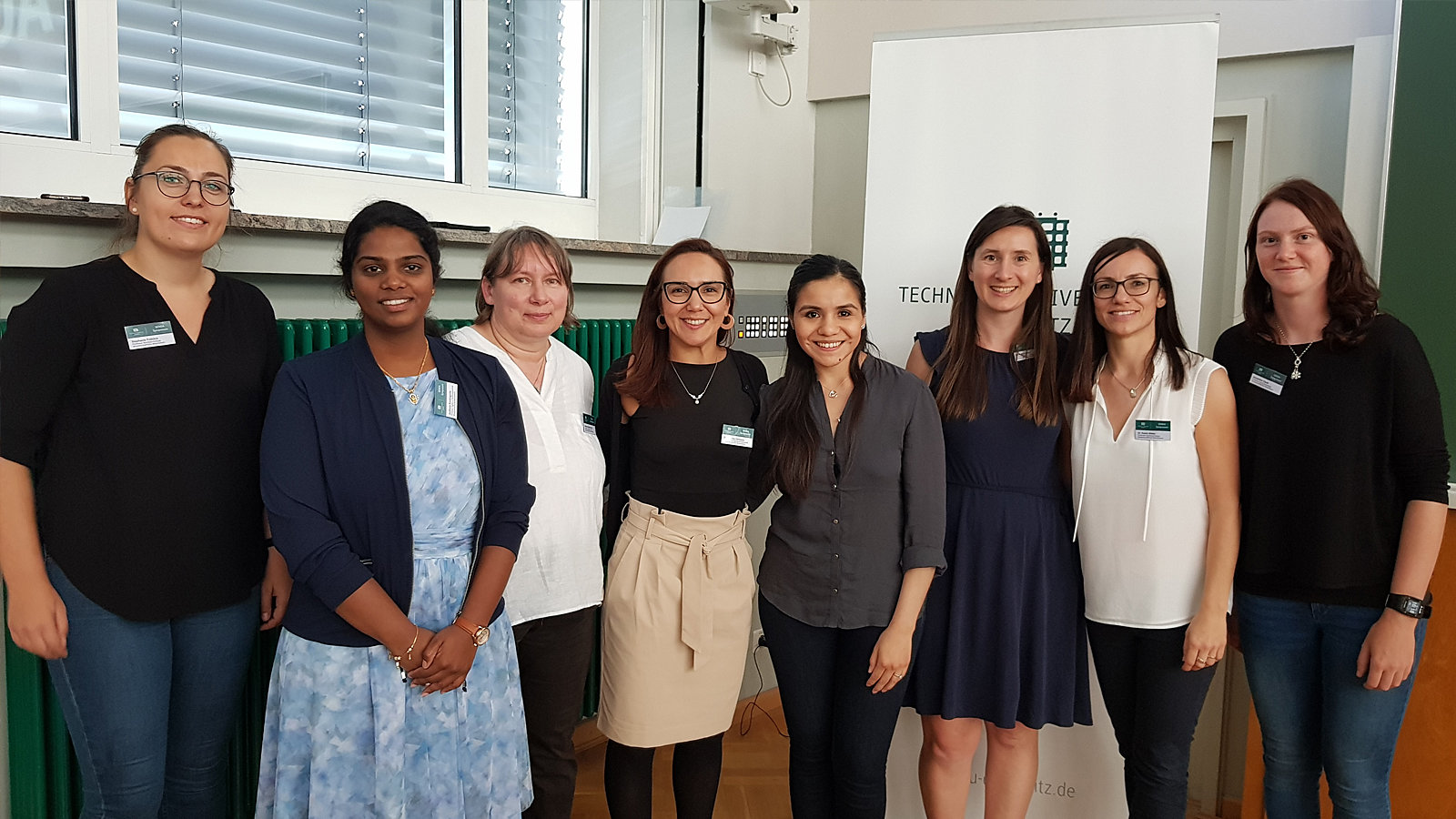Driving dementia research forward
Symposium gives insight into ongoing research project at Chemnitz University of Technology
-

Researchers from various professorships, most often in the early phases of their careers, are involved in the project SENDA. From left: Stephanie Fröhlich, Jyothsna Kondragunta; Monika Rehbein-Kutz, Dr Andresa Germano, Dr Maria Fernanda Agoitia, Karen Mersiovsky, Dr Katrin Müller and Alexandra Clauß. Photo: Project SENDA
After a project phase that ran two years, researchers from the Chemnitz University of Technology research project SENDA (Sensor-based systems for early detection of dementia – a reaction to demographic change), which is funded by the European Social Fund (ESF) and the State of Saxony, held a symposium at the university. The symposium was open to all interested parties, as well people who had already participated in the study. The researchers presented preliminary results to an audience of 120 people.
At the symposium, research director Prof. Dr. Claudia Voelcker-Rehage from the Professorship of Sports Psychology, Project Coordinator Dr. Katrin Müller (Professorship of Sports Psychology) as well as Prof. Dr-Ing. Gangolf Hirtz (Professorship of Digital Signal Processing and Circuit Technology), Karen Mersiovsky (Professorship of Sports Psychology), Dr. Andresa Germano (Professorship of Human Locomotion), Stephanie Fröhlich (Professorship of Sports Psychology), Jyothsna Kondragunta (Professorship of Digital Signal Processing and Circuit Technology) and Dr. Maria Fernanda Agoitia (Professorship Analysis) gave talks on various aspects of the project.
These aspects included the impact of dementia on:
- simple, reproducible fine motor tasks
- changes having to do with falling and balance
- brain activity recorded via electroencephalogramm (EEG) during various tasks, as well as at rest
- various gait parameters
Talks also covered:
- technical systems for people suffering from dementia
- statistical procedures and new methods of statistical learning for data analysis
Claudia Voelcker-Rehage pointed out what makes SENDA different from other studies that focus on the early detection of dementia: “SENDA does not focus solely on the cognitive changes, but instead tries to look holistically at the changes that the individual is going through. To do that, we use, among other things, technological innovations in sensor technology and optical image recognition, and we combine all this to drive forward the early detection of dementia.”
Subsequently, Katrin Müller spoke about the current status of the research project, which will conclude in July 2020. So far, 198 participants aged 80 years and above from the greater Chemnitz area have taken part in the project. Since its inception, all in all 1,047 tests have been carried out at the laboratories of Chemnitz University of Technology by the team of up-and-coming researchers. Repeat testing will resume in October 2019. In addition, plans include the involvement of 60 new participants in the study before the end of the project.
More participants are still needed
The recruitment of participants aged ≥80 years has not yet concluded. Anyone interested in taking part in the research project on the early detection of dementia is welcome to contact the research team via the study hotline (phone: 0371/531-19938) or by email (senda@hsw.tu-chemnitz.de).
Background: SENDA
The SENDA project is being carried out by up-and-coming researchers from the following groups at Chemnitz University of Technology: Sports Psychology, Human Locomotion, Digital Signal Processing and Circuit Technology and Analysis. They have been working on developing a new multidimensional instrument for the early detection of dementia since August 2017.
Contact: Dr Katrin Müller, Institute of Human Movement Science and Health, Professorship Sports Psychology, Phone 0371-531 19938, Email: senda@hsw.tu-chemnitz.de
(Article: Matthias Fejs / Translation: Jeffrey Karnitz)
Matthias Fejes
25.09.2019




